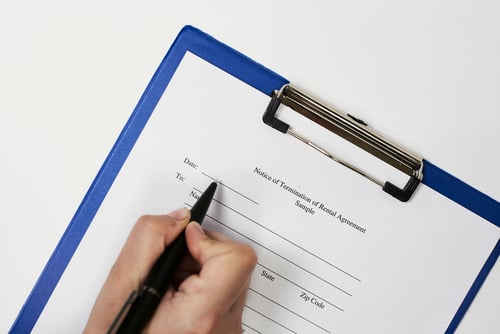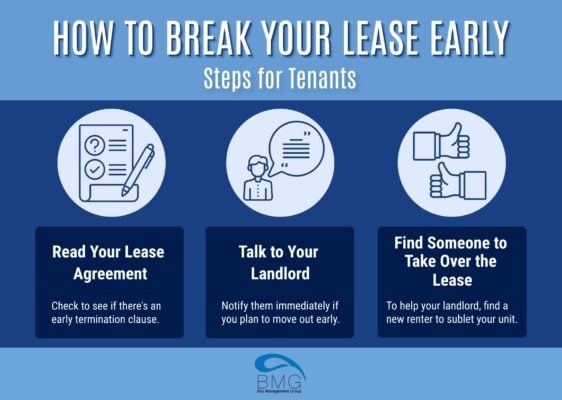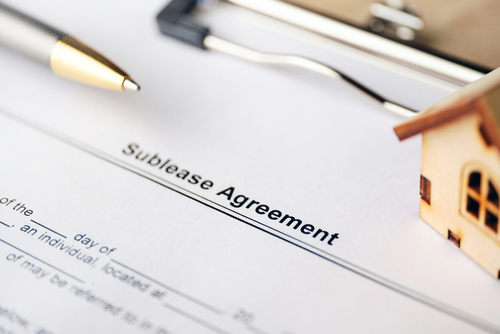When you sign a lease agreement, you’re usually obligated to live at a rental for a certain amount of time. However, it’s not uncommon for plans to change or events to pop up that may affect your ability to stay for the duration of the lease. For example, you may want to break your lease if you find a job in a different city, encounter a medical emergency, or are dissatisfied with the property. Today, we’ll go over how to break your lease, the consequences, and legal justifications for breaking a lease. Read along to learn more.

Contents of This Article:
- Can You Break Your Lease Agreement?
- Consequences of Breaking Your Lease
- Legal Reasons to Break a Lease
- What to Do If You Want to Break Your Lease
- Importance of Landlord-Tenant Communication
Can You Break Your Lease Agreement?
Whether or not you can break your lease agreement depends on several factors. For instance, it depends on the terms and conditions outlined in the lease and applicable laws in your jurisdiction. That said, most lease agreements from property management companies in Northern Virginia are legally binding contracts between a tenant and a landlord.

Some lease agreements have an early termination clause, which allows tenants to terminate the lease under certain conditions. For instance, if you’re relocating for a job or medical issues, you may be able to work something out with your landlord to avoid penalties.
In other cases, you may be able to come to a mutual agreement with your landlord to terminate the lease early. Additionally, your lease may permit subleasing or assigning the lease to another person if you must leave early. This option allows you to find someone else to take over the lease obligations as long as your landlord approves.
Your lease agreement specifies the obligations and rights of both parties for the lease duration. As such, breaking a lease typically carries some consequences, like financial penalties or legal action. However, there are a few legal reasons you can break a lease without facing severe consequences. So first, let’s review some of the consequences, and later we’ll discuss legal reasons for breaking a lease.
Consequences of Breaking Your Lease
Breaking any legal contract comes with some risks. When breaking a lease agreement, the risks are typically financial. However, it’s possible that you may face legal risks, which may affect your future as a renter. Here’s what may happen if you attempt to break your lease early.
- Be Prepared for Fees- Breaking a lease may result in hefty fines. Unfortunately, an early termination fee could cost up to three months’ rent, and you’ll lose your security deposit.
- You May Get Sued- If your lease agreement doesn’t allow for early termination, but you break the lease anyway, your landlord may take you to court. If so, you’ll need to defend yourself in small claims court.
- It May Be Harder to Rent- While you may want to look for a cheaper apartment to move into, it could take weeks or months to find one. Additionally, if other landlords know that you broke your lease early, they may choose not to rent to you.
- Your Credit Report May Suffer- Breaking a lease and failing to pay rent could impact your credit score. For instance, if your landlord reports your late payments to the credit bureaus, it could show up on your credit report and negatively impact your score.
Legal Reasons to Break a Lease
As stated earlier, a few legal reasons allow you to break your lease early without repercussions.

If you find yourself in any of the following scenarios, contact your landlord immediately to inform them of your situation and your plan to leave the rental.
- Health or Safety Code Violations
- Landlord Harassment or Tenant Privacy Violation
- Active Duty Military
- Victims of Domestic Violence or Abuse
Health or Safety Code Violations
It’s your landlord’s responsibility to maintain the rental to a certain standard. For instance, your landlord must provide running water, heat, sanitation, and overall safety. If your rental violates any health or safety codes, you may be able to break your lease early.
Landlord Harassment or Tenant Privacy Violation
If you’re experiencing harassment, threats, or violence from your landlord, you may leave the rental and legally break your lease. For instance, if your landlord enters the premises without notice, cuts off the use of previously given amenities, changes the locks without notice, or threatens you in any way, you may break your lease. However, if your allegations are false, you may be taken to court to dispute your claims.
Active Duty Military
If you enter active military service after signing a lease, you have a right to break your lease agreement under federal law. Under the Servicemembers Civil Relief Act (SCRA), any service member called to active duty can break their lease penalty-free. However, you must provide a minimum of 30 days’ notice and must be deployed for no less than 90 days. Additionally, service members should prove they signed their lease before being called to active duty.
Victims of Domestic Violence or Abuse
If you’re a victim of domestic violence or sexual abuse, you have the right to move out of your rental right away without repercussion. First, however, you must give your landlord or property manager written notice. Then, you’ll have 30 days to move out and find a safe place to live.
What to Do If You Want to Break Your Lease
Learning about the consequences is important if you’re considering breaking your lease early. Additionally, you’ll want to take a few steps to ensure you don’t break any laws and leave the rental respectfully. So, here’s what to do if you want to break your lease agreement.

- Read Your Lease
- Talk to Your Landlord
- Find Someone to Take Over the Lease
Read Your Lease
If you plan on moving out of your rental early, you’ll want to read over your lease agreement first. Some rental agreements have an early termination clause, which allows you to break your lease as long as you pay penalty fees and give up your security deposit.
That said, your rights and responsibilities as a tenant can vary from state to state. As such, you’ll want to determine which laws apply to your state and county.
Talk to Your Landlord
You’ll want to schedule a meeting with your landlord or property manager. If you’re unhappy with your property and it’s causing you to want to leave, they may be able to assist with fixing the issue. Additionally, if you’re on good terms with your landlord, they may be more willing to work with you to find a mutually beneficial solution.
If you’re set on leaving the property, it’s important to notify them immediately. Come prepared with an action plan, including when you plan to leave the property, if you plan on finding someone to sublet your unit, and how you’ll ensure they don’t face financial hardship.
Find Someone to Take Over the Lease
One of the simplest ways to break your lease is by finding a new renter to sublet your unit. With this arrangement, the other tenant moves in and takes over rent payments.

However, not all leases allow subleasing, so it’s crucial to carefully read over the terms and conditions. Additionally, communicating with your landlord throughout this process is crucial, so they can approve the new tenant.
If the new tenant fails to pay rent or damages the property, you’re still responsible for those payments or fees. To avoid this, you can request that the landlord starts a new lease with the new tenants, so you’re no longer responsible for rent payments or damages. However, landlords aren’t obligated to end your lease early and rent to new tenants.
Importance of Landlord-Tenant Communication
Communicating with your landlord or property manager is crucial throughout the entire rental process. If you’re considering ending your lease early, educating yourself on landlord-tenant laws and communicating with your landlord is important. Leaving a rental without notifying anybody can result in hefty fines or legal trouble.
Bay Property Management Group has a team of reliable property managers that can assist with anything you need throughout the rental process. Whether you need maintenance or have questions about your rental property or lease agreement, our team of qualified managers can help.
Need More Advice? contact us today!
On the other hand, if you own rental properties and want to streamline your rental processes, BMG can help. We offer comprehensive rental management services, from tenant screening to maintenance, rent collection, and more. Contact us today to learn more about our services throughout Baltimore, Philadelphia, Northern Virginia, and Washington, DC.
